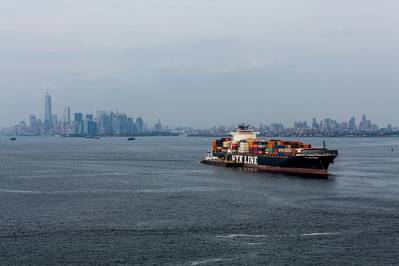Container Shipping Turmoil Spills Over Into 2023, says Xeneta's Sand
As container shipping demand continues to fall into the New Year, Xeneta Chief Analyst Peter Sand weigh in with his insights on the pace and direction of spot and contract rates; the likelihood of ship lay-ups and scrapping in 2023; plus the impact that West Coast port labor strife will have on the industry as a whole, as the East Coast U.S. emerges as the dominant player.
- To start us off, what do you see as far as falling demand and the blank sailings of container ships leading up to the Chinese New Year.
Peter Sand
What I see in the market right now is quite dramatic, almost unprecedented. [Much like the financial crisis in 2008-09] we see carriers being desperate in capacity management. They're applying the soft tools up front, blank sailings and idling here and there. But sooner [than later] we will also see layups and demolition picking up later in the year. [When you look at the numbers] volumes fell by 20 to 30% when you compare November data to that of the year before. So it's really a “don't try to catch a falling knife” game that shippers, freight forwarders and carriers find themselves right now. It’s very dramatic at the moment.
- When we look at the market today, it looks like spot rates are almost at that pre-pandemic level. Do you expect contract rates to follow suit?
Peter Sand
What we see in Xeneta data right now is that some of the sharpest [negotiators], the top dogs in the shipper community, are capable of signing long-term contracts right now at spot rate levels. But on average we do not see that yet. Of course, the market is also full of many smaller- and medium sized shippers, and they’re trying to stem the hemorrhage of the markets. If they were to ‘drop their pants’ right now on the long term [contracts], they would face a backlash of negotiation quests from all their customers that have signed long-term contracts throughout the upturn. [There is definitely a] shying away from signing long-term contracts right now.
- Let’s turn our attention to the U.S. market: is anything happening on the US West Coast as far as the labor negotiations concerned, and how does this impact shippers that have shifted to the East coast since last summer?
Peter Sand
I think it's fair to say that the negotiations on the U.S. West Coast are going nowhere. They're not even talking about what we, from the outside, would expect to be the main obstacles, like salaries and automation. They're talking about politics. The shippers, of course, have diverted some of their volumes, and the longer they divert their cargoes into the U.S. East Coast, the more hesitant they will be to move the cargo back.
That's also been a part of the story between the US and East Coast and West Coast in the past couple of years where the East Coast volumes have been growing faster than the West coast. So if I were a part of the negotiations on the West coast, I would strike a deal as soon as possible in order to bring back lost volumes as ASAP, because otherwise it could be more of a long-term damage done if they failed to do so. And shippers, they just want the best service they can get. And right now, that's definitely not on the west coast.















